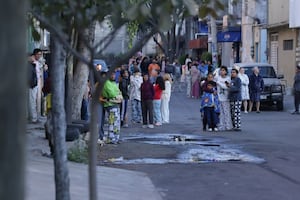Más Información

FGR extrae información de la caja negra del Tren Interoceánico; reitera que habrá reparación integral del daño

Capturan a “El Betillo” en Morelia; lo vinculan con asesinato de Hipólito Mora, fundador de las autodefensas michoacanas

Ernestina Godoy nombra a Ulises Lara, fiscal especial en Investigación de Asuntos Relevantes; "estaremos trabajando por la justicia"

Sismo en CDMX: “Nos sacó un susto porque se movió como gelatina”, relata empleado de estacionamiento público
The Digital Repository of Cultural Heritage in Mexico (RDPCM) brings together the digital collections of museums, libraries, TV stations, radio stations, and cultural institutions such as INAH, INBA, INALI, IMCINE, the National Center of the Arts, and Channel 22 , among others coordinated by the Ministry of Culture .
More than 700 thousand digital objects from 17 institutions were made available yesterday through the RDPCM website through a project that was part of the Ministry of Culture’s digital agenda .
During the RDPCM’s conceptualization and development stage , the Ministry of Culture has sought to represent the archeological, historical, artistic, audiovisual, and auditive heritage of Mexico .
In an interview with EL UNIVERSAL , Ernesto Miranda, coordinator of the digital agenda, and Vania Ramírez, archive maintainer , indicated that one of the main challenges of this stage was to increase the number of contributors and enrich the registry with more digital objects.
On the website, users will find a global search box in which they will be able to type in keywords to conduct the search. For example, if one were to write “ opera ,” the website would open a window containing all registries with videos from the National Center of the Arts (CENART), audio recordings from the Radio Educación network, texts from the National Institute of Fine Arts (INBA) , among others.
According to the project planners, the Digital Repository required an investment of 3 million pesos and will continue to be enriched through different cultural institutions in the country. Mexico’s National Autonomous University of Mexico is expected to join the project soon through its Aesthetic Investigations Institute . Furthermore, users will be able to make file donations that may add to the country’s cultural heritage. The repository features pre-Hispanic codices and documents of various periods.
Miranda and Ramírez explained that the repository is of open-access , though the archives cannot be downloaded. Each piece includes a data sheet and is copyright-protected .
To facilitate the search, the website features tabs that allow for the users to search by collection, exhibition, and chronology.
dm
Noticias según tus intereses
[Publicidad]
[Publicidad]











